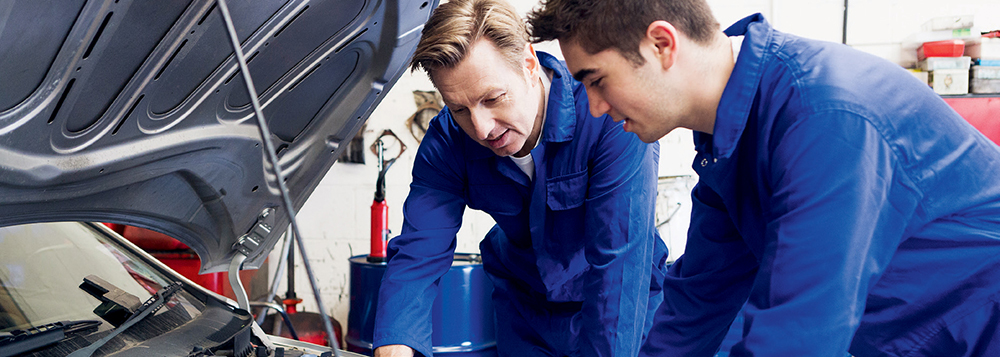Retirees have a lot to offer young people, and they get much in return for sharing
By Wendy Haaf
Photo: iStock/industryview.
The first time we spoke on the phone, on an afternoon in October 2019, Liz Martorano was in a Brantford, ON, mall, surrounded by an excited hubbub of voices. The following day, the director of SKIP Brantford—“SKIP” is an acronym for Seniors and Kids Intergenerational Programs—explained that the crowd around her the previous day had consisted of a mix of seniors, tech-savvy teens from grades nine to 12, and students from an elementary-school classroom of gifted learners, with the youngsters answering questions about how to use digital devices.
In an age in which the generations are increasingly segregated and many kids live far away from grandparents, “our mission is to bring the young and the elders together,” Martorano says, “which is mutually beneficial for many reasons. We do it through music, we do it through theatre—we have many different programs.”

Photo: iStock/fizkes.
SKIP is one of a number of initiatives scattered across the country that help facilitate the kind of intergenerational interaction that was far more common in the days when people were less insular and more apt to socialize with neighbours of all ages. “We’re not trying to create anything new,” Martorano explains. “We’re just trying to bring this back.”
According to a 2016 report sponsored by the Stanford Center on Longevity, encore.org, and the Packard Foundation, older adults are uniquely suited to mentoring youth and helping them learn the skills they need to navigate an increasingly complex world. These skills, which include critical thinking, problem-solving, and social interaction, “are the key to success in school and work, and they enable people to contribute meaningfully to society,” the authors write. And as it happens, research has shown that our brains become better at these very things as we age.
There’s an abundance of studies that have shown that young people mentored by older adults benefit from lower levels of truancy, drinking, illicit drug use, physical aggression, and depressive symptoms, and higher levels of educational attainment. And there’s a good deal of evidence that volunteering of any kind later in life is linked with better physical and emotional health, and even increased longevity. Yet scientists have only recently begun to tease out specifically what older adults might gain from mentoring someone much younger. Overall, we know such relationships are beneficial, says Stephanie Hatzifilalithis, a PhD candidate in social generontology in the Department of Health, Aging, and Society at McMaster University in Hamilton, ON, “but to what extent and how that works, we don’t really know.”
Until those gaps in the scientific literature have been filled, however, we can learn from those who have experienced or witnessed these connections. Here are just a few of the reasons to consider becoming a mentor.
It’s good for your brain.

Photo: iStock/fizkes.
There’s nothing quite like learning new things for keeping your mind sharp, and that’s something that John Moore, 82, has been doing for more than two decades as a volunteer with PRIME Mentors Canada. (“PRIME” stands for positive, responsible, inspiring, multitalented, and exemplary.) The Toronto-based initiative pairs volunteer mentors—many of whom are retirees—with creative, talented, bright Grade 5 and 6 students (primarily from economically challenged neighbourhoods) who have untapped potential and who would benefit from an extra challenge.
After selecting a topic about which they’d like to learn more, mentees meet with their mentors once a week for guidance on how to research and write a talk that the student then presents to the class. (Typically their parents and sometimes grandparents are invited, as well.) Moore’s most recent protege, an 11-year-old girl, chose black holes because she wanted to find out what happens to objects that disappear into one. “What do I know about the black hole?” the retired stockbroker asks. “Nothing. Part of the fun for me is the research.” Over the next several weeks, he helped her track down the information she needed and put it together in a coherent format, using the techniques he learned for writing a college essay.
Some research suggests that similar kinds of mental stimulation can improve certain types of brain function in people who are at an elevated risk of developing cognitive impairment. In a 2009 pilot study, eight female at-risk volunteers aged 60 or older and nine matched controls were recruited to join the Baltimore branch of the Experience Corps, an in-school literacy tutoring program. On enrolment and again six months later, participants performed a test that measures one’s ability to ignore irrelevant information while carrying out a task (the ability to focus in this way tends to decline with age) and then underwent MRI scans. The tutoring group experienced improved test scores and showed increased activity in areas of the brain known to be involved in executive function.
You can break down generational stereotypes.
Among her many accomplishments, Wilma Abriel of Brantford, ON, is an accomplished artist, plays the organ, and has written a book. Her long and varied career included teaching religious education, working as a hospital ward aid, and raising visually impaired children as a house parent at a specialized school. So, even though she’s 94, she can nevertheless often find common ground with the children and teens from the SKIP initiative who visit her retirement home.
In the process, the kids learn things that help them see her as an accomplished, capable woman who has successfully done things that originally scared her (such as learning to drive) and that they have likely never experienced (such as locating and travelling among 17 country schools using only a hand-drawn map and a compass). If students are interested in art, Abriel takes them to see her paintings. “If they’re interested in music, I go in that direction,” she says. “If they’re interested in teaching, I go in that direction. It gives them an interest in what older people are capable of doing.” And indeed, there is research suggesting that intergenerational programs have the potential to reduce discrimination against older adults and lessen the stigma associated with aging.
That’s likely no surprise to Karen Sealy and Heather Currah, who worked together on a project in the summer of 2019. Sealy organized a club at the Beacock branch of the London Public Library, where she works, that invited residents of the Kensington Village retirement home, where Currah is a recreational therapist, to help kids learn and practise cursive writing. Such opportunities give children a chance to see older people as having skills; additionally, “it teaches them how to treat seniors,” Currah says. When the youngsters’ thank-you notes were read aloud during the last session, “it was so touching,” Sealy adds. (For their part, participants such as Francine and Margaret, a former school bus driver, got a kick out of the experience. “I enjoyed seeing the kids,” Francine says. “I’d never heard the word cursive,” Margaret adds. “I found it very interesting.”)
Mentoring can make you feel more positive about younger people, too. That’s something retired accountant Murray Jones has noticed as a volunteer with Salthaven Wildlife Rehabilitation & Education Centre in London, ON: he’s consistently impressed by his younger co-workers. He says that while he has met millennials who live up to the media portrayals of them as entitled and lazy, “I don’t see that with the people out at Salthaven.” To illustrate, he shares a story of two volunteers—one, a well-off 50ish woman who drives a Mercedes, and the other, a 20-year-old who travels everywhere by bike—working side-by-side at the same unglamorous job: cleaning cat carriers soiled with goose poop. “Everyone is there for the right reasons,” Jones says. “They’re not trying to impress people or get paid.” He particularly enjoys talking with students who are being trained as supervisors and managers about their aspirations for the future. “It’s fun,” he says. “Very rewarding.”
It helps keep you feeling young.

Photo: iStock/SolStock.
As with other types of volunteering, intergenerational mentoring has been linked with decreases in depressive symptoms, increases in physical activity, and improved self-perceived health, even among people with social and physical challenges. For instance, in a 2006 study, older women who had taken up positions as foster grandparents or senior companions through the Experience Corps saw a kilocalorie-a-week increase in physical activity of 40 per cent four to eight months later, versus a 16 per cent decrease among controls.
And perhaps there’s something about mentoring youngsters that’s uniquely motivating when it comes to staying active. Conchita Tan-Willman, the founder and president of PRIME Mentors Canada, says that many retirees who have volunteered with the organization over the past 30 years kept coming back until very late in life—such as a gentleman over 90 who volunteered at a school five full days a week until he was forced to stop due to ill health. “I think it was his nutrient,” she says. “When I talk to our mentors, they say the enjoyment and energy that they get from these kids are something they can’t describe. They feel young again.”
PRIME volunteer John Moore, for example, is clearly invigorated by his mentees’ imaginations and refreshing ideas. He’s clearly tickled while recounting how one student who was writing a mystery story left one session with the aim of devising a way for a character to leave a blood sample at the crime scene. “The next week, she comes back looking very solemn and says, ‘My mother won’t let me kill anybody in my story,’” he says with a chuckle.
Then there was the Q&A after a presentation on the heart by a different student who wanted to become a cardiac surgeon because one had saved her life when she was a baby. A classmate raised her hand in response to the question “What’s the most important organ in the body?” “This little girl—she’s 11—says, ‘I think it’s the brain,’” Moore recalls. Asked why, “she says, ‘If your heart gets sick, you can get a transplant, but if your brain gets sick, you can’t.’ For me to hear that was astounding,” Moore says. “That’s what turns my crank to keep doing this.”
The parents’ pride and the students’ sense of accomplishment don’t hurt either. “After the presentation, these kids feel like they’re nine feet tall,” Tan-Willman says.
Stephanie Hatzifilalithis, who is involved with Symbiosis, a McMaster University-based program that “aims to connect seniors with graduate students for a mutually beneficial housing relationship,” says a fresh outlook is also a big part of the program’s appeal for the older co-housing partners. When asked if they would consider home-sharing with someone in their own age group, “a lot of the time, they say no,” Hatzifilalithis says. Instead, they’re drawn to “someone who engages in a completely different lifestyle, at a different point in life.”
You’ll make the world a better place.
Often, the benefits of mentoring are contagious. For example, according to Tan-Willman, not only have many PRIME mentors gone on to receive prestigious scholarships over the past 31 years, “they’re also conscious of contributing to the community,” she says.
Wilma Abriel, too, has witnessed how some of the wisdom she’s shared has spread. She recounts a teen who was obviously reluctant to be there and drawing her into conversation by asking about her interests. “I said, ‘If you give up math, you’re throwing a key away,’” she recounts. “‘If you’re not interested in this subject or that subject, you’re throwing another key away. Now you go and look for a job—what do you have to offer? You’ve thrown all your keys away.’” At an event some time later, the two ran into each other again. “She came over and sat with me,” Abriel says, “and she said, ‘I’ve told other people about the keys.’”



